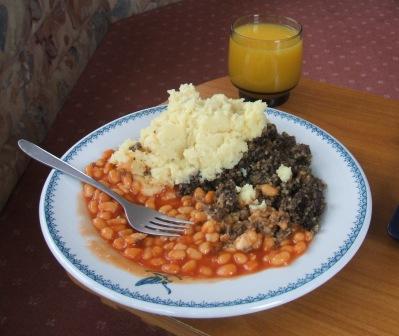Not everyone’s idea of home, but it will be for me in a little over 10 weeks…..
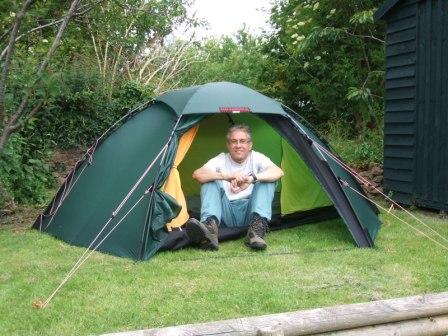
Somewhere in Somerset - Photo Jon Bazley

A week since my return from Scotland. The inevitable domestic chores, the endless post and such like that come with being away for a month. But also chance to reflect on what I’ve learnt out on the road. From a purely practical perspective, lots ideas about how to refine the cycle and all the kit that goes with it. All this is hugely beneficial I don’t deny, but rather more useful has been the mental preparation. I found myself pleased to be back in my village, my head nestling amongst fluffy pillows rather than the Paps of Jurra, and yet a bit saddened I wasn’t still out on the road, waiting to see what exploits each new day brought. The right balance.
So, enthused by the experiences of the last month, and driven by a little over thirteen short weeks to depature, things have been very hectic since my return. In a satisfying sort of way. Expedition tent chosen and ordered, being flown in from Sweden. Starting to make considerable headway in getting my personal affairs in order ready to hand over to my mother when I grant her Power of Attorney. Lots and lots of stuff. Doing is good, but rest and relaxation is equally as important to maintain clarity of thought and a clear sense of direction. Nearby Wiveliscombe has the perfect tonic to help relax, a heated outdoor pool with a really friendly crowd of regulars. And after that, sleep comes easily…
I suddenly remembered why I didn’t like taking my cycle on trains. It wasn’t the lack of facilities,as these are generally pretty good, provided you’ve made the effort to make a cycle reservation. No, for the most part it’s fellow cyclists. Those who don’t bother to plan ahead, but seem genuinely surprised when there’s no space left for their cycles. Funny bunch.
During this trip I’ve visited a few railway stations and met some really helpful staff who take pride in their work. Grange-over-Sands had its hanging baskets and immaculate toilets. I asked the lady in the kiosk if they were award-winning. They were. At Fort William my ticket home, together with cycle reservations across three different train companies, was arranged without fuss. And then a brief change in a small border town. Securing my fully laden bike momentarily to a convenient stanchion, Jobsworth appeared. ‘We remove abandoned cycles’ he informed me. I didn’t think my bike looked like it was going to be abandoned anytime soon. I’m sure he had his reasons. They always do. It was a light and airy station but the platform staff nevertheless stayed close together. Occasionally one disappeared briefly to forage for food. Our man clutched his train dispatch sheet tightly.
Ardrossan looked just like any commercial port town I’ve ever been to. Depressing. I must have looked lost. Having gone just a short distance from the ferry, I stopped momentarily to consult the map when a lady asked if she could help. The chips she carried smelt good, but instead I asked for directions to Troon. Her directions were precise, and proved accurate. She had travelled extensively with trade plates, delivering vehicles all over the UK, and seemed sympathetic to my uncertainty as to where I might stay that night. I appreciated her openness, and reciprocated by admitting that I would have been one of those many drivers who would always have ignored her requests for a lift. She understood.
The sign welcoming you to Troon tells you it’s the home of C K Marr. Shipping charterer apparently. He left at an early age and did not return. The town has lots of golf courses. Lots. But no campsite that I could find. There were lots of helpful suggestions from people as to where it might be, but all came to nothing. There was also a dirth of B&Bs. It was getting quite late. A seafront shelter was starting to become a realistic prospect, but I doubted I could now even get a brown paper bag for my meths.
I met two Australians, father and son, also searching for somewhere to stay. They had a car. Feeling sorry for me on the bike, they gave me a business card for a B&B nearby that might be able to help. I accepted graciously. Thirty minutes later I was in a very well appointed house a few miles from Troon. A good end to the day.
The island’s brochure was right. You can’t do Arran in a day. But if you are hard-pressed to see much of Scotland, there is Arran. Arriving late in the evening, I had camped a mile or so from the slipway at Lochranza, on the north-west side of the island. Iain owned the campsite, together with its generously hot showers. Louise and Brian had recently taken on the running of the on-site ‘Pavilion’ cafe and shop. They were very committed, having left behind the relative sophistication of Glasgow, bringing their two children with them to carve out a future in more idyllic surroundings. They had a dream of better things and had done something about it. You sensed that in just a short time they had begun to make the place their own. I admired them.
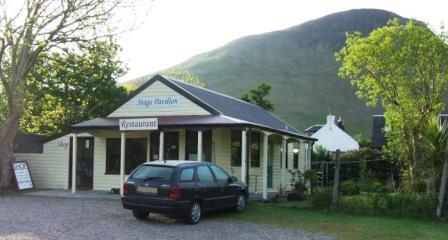
Pavilion shop and cafe
In the morning I headed anti-clockwise around the coast from Lochranza. A distinct Outer Hebridean feel – windswept, cottages huddling together in small settlements – soon gave way to warmer, more undulating countryside. At Lagg, tucked away in a sheltered valley towards the southern tip of the island, I found palm trees. This could have been the English Riviera, perhaps the Isles of Scilly. The island of Ailsa Craig, south of Arran, was prominent. The map indicated it had a castle, which struck me as odd, and unnecessary, for the place appeared to be a natural fortress. The golf courses grew in number as I started north up the east coast. The first notable village, Whiting Bay, had bungalows, an alarming number up for sale. Brodick, and the ferry to the mainland, was soon close. A viewpoint a mile or so short provided a final glimpse of Goat Fell and its fellow Cullin-like mountains in the north of the island. I realised why the island is often referred to as ‘Scotland in minature’.
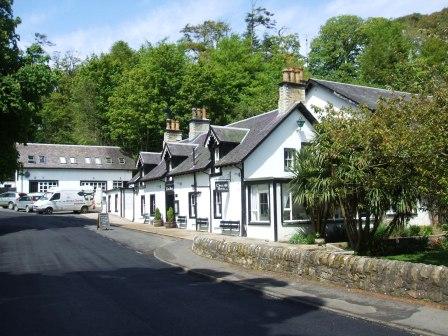
Village of Lagg, Southern Arran
Island life has always fascinated me since I first visited Caldey, a little way off the Pembrokeshire coast, many years ago. Caldey is known for three things – monks, chocolate, and perfume made from gorse. An interesting mix; the chocolate I understand but quite what inspired the monks to experiment with perfume derived from gorse bushes has always elluded me. Some while back I had the chance opportunity to visit a small, remote island community in the Southern Oceans at a time when visitors were relatively rare. The island’s administrator had gone native, or at least he wore an ear ring. Many aspects of life there seemed familiar – children running around in the primary school’s playground, the warm welcome in the white-washed cafe. And yet you sensed subtly different social norms beneath the surface. Not the case with Arran I might add.
The road south from Oban towards Lochgilphead is an ‘A’ road, although with all its twists and turns, and some cheeky little climbs, you’d be forgiven for thinking otherwise. It was also wet. Very wet. A supposedly brief stop at the Quaich Cafe in Kilmelford late in the morning easily became an early lunch. The seafood chowder wasn’t quite ready, but I could wait. Caroline ran the cafe, and Anne the well-stocked shop below it. I chatted to Caroline for a good while. We soon stumbled on my favourite hostelry north of Loch Lomond that prided itself on its supposed Scottish authenticity. She quickly guessed where I meant. I suggested that Scotland was a justly proud nation with a distinct national character. It did not need to resort to such gimmikry.
I continued south, enjoying a much brighter afternoon. A brief stop in Lochgilphead. Then Tarbert. A police officer loitered on a street corner. At least you could see him. I toyed with camping on the mainland and catching the early morning ferry to Arran, but quickly succumbed to the challenge of making the last sailing that night.
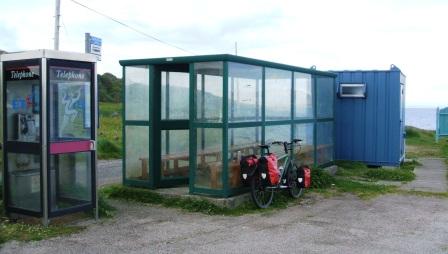
Claonaig ferry terminal
I’m not sure what I expected to find at the Claonaig, a few cottages perhaps. But in the end there was just the slipway, a small shelter and a toilet that resembled a sea container. Nobody wanted to leave Arran that evening, at least, no one got off the ferry, not a single car or foot passenger. Embarkation was brief, just myself, a car and a camper van. I wandered around the vessel. A sign in the elongated passenger cabin advised that there was a toilet on the upper deck. Was there also a bidet I wondered? Probably. In rough weather.
One of my favourite British films of recent(ish) years is the relatively little known ‘Dog Soldiers’. Set in remote Highlands near Fort William, it is, as the title suggests, probably not a ‘chick flick’. True, it does feature a young woman, but she has a few issues. Especially when there’s a full moon. No, what really makes it for me is its capture of British squaddie humour – unrelenting, sharply observed lines with perfectly timed delivery. Well worth watching before a spot of wild camping. If you have a pen knife. And it’s made of solid silver. It’s against this back-drop that I head south towards Oban, on to the Isle of Arran, and then finally to Troon and a return to Somerset via rail. I had hoped to return via Ireland and South Wales, but the expedition departure date gets ever closer and the additional time this route would involve cannot be justified for the training benefit I’d be likely to get from it. What I do need now is some challenging weather to test out equipment changes I’m made in the last few days in Fort William. I doubt I’ll be disappointed.
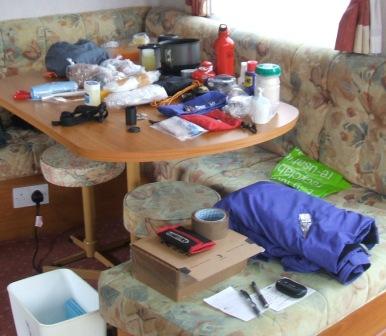
After over 800 miles and some hectic but very rewarding visits to The Outward Bound Trust centres at Aberdovey, Ullswater and Loch Eil, it’s time to take stock of what I’ve learnt – be that about the Trust and their work with young people, or the expedition bike and the kit that goes with it. A small caravan tucked away just outside Fort William provides the ideal location – quiet, ready access to a busy town with lots of outdoor shops, and good internet access via my netbook. Also an opportunity to plan my route back to Somerset.
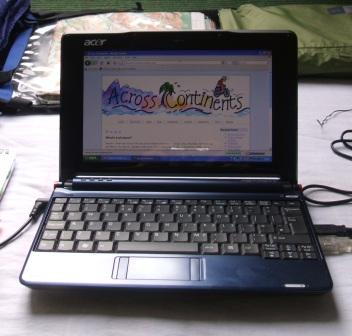
And what the haggis and neaps lacked in authenticity was more than made up by improvisation… well possibly….
